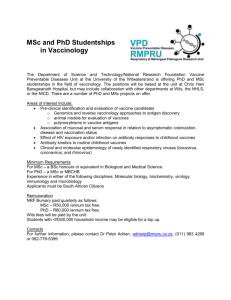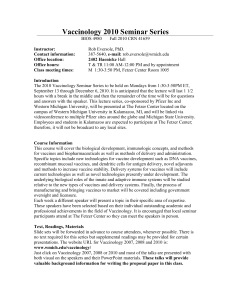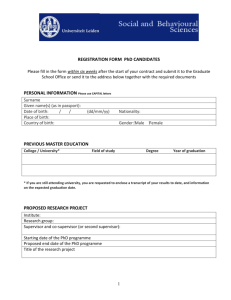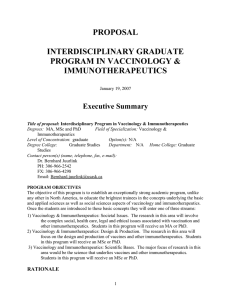Document 12038067
advertisement
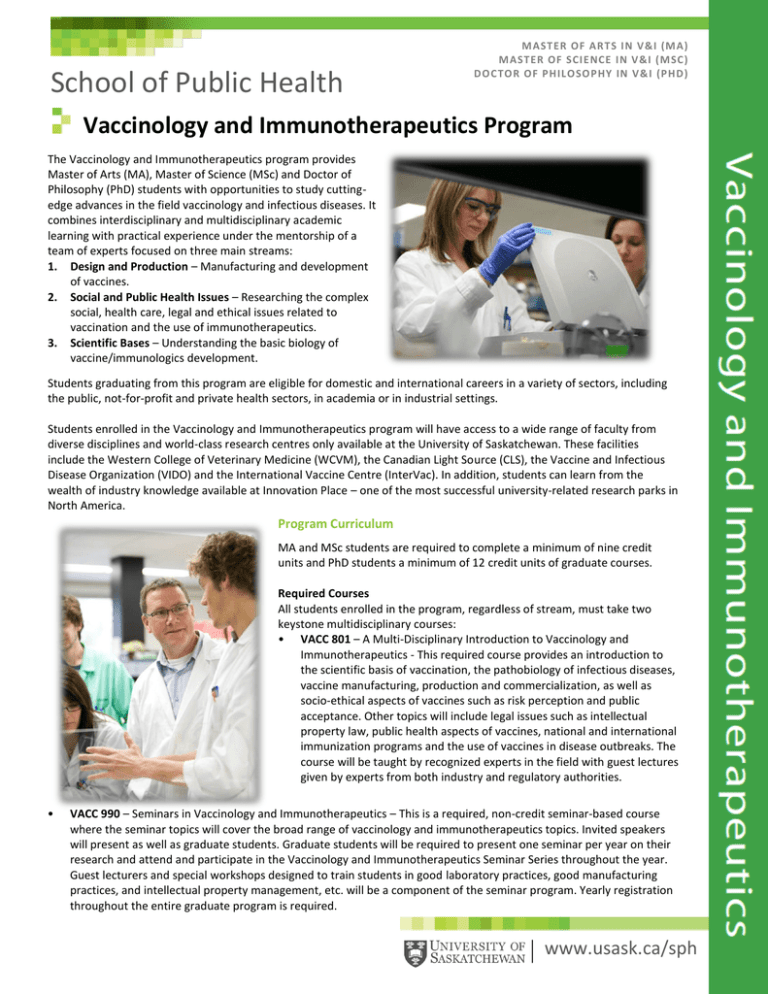
School of Public Health MASTER OF ARTS IN V&I (MA) MASTER OF SCIENCE IN V&I (MSC) DOCTOR OF PHILOSOPHY IN V&I (PHD) Vaccinology and Immunotherapeutics Program The Vaccinology and Immunotherapeutics program provides Master of Arts (MA), Master of Science (MSc) and Doctor of Philosophy (PhD) students with opportunities to study cuttingedge advances in the field vaccinology and infectious diseases. It combines interdisciplinary and multidisciplinary academic learning with practical experience under the mentorship of a team of experts focused on three main streams: 1. Design and Production – Manufacturing and development of vaccines. 2. Social and Public Health Issues – Researching the complex social, health care, legal and ethical issues related to vaccination and the use of immunotherapeutics. 3. Scientific Bases – Understanding the basic biology of vaccine/immunologics development. Students graduating from this program are eligible for domestic and international careers in a variety of sectors, including the public, not-for-profit and private health sectors, in academia or in industrial settings. Students enrolled in the Vaccinology and Immunotherapeutics program will have access to a wide range of faculty from diverse disciplines and world-class research centres only available at the University of Saskatchewan. These facilities include the Western College of Veterinary Medicine (WCVM), the Canadian Light Source (CLS), the Vaccine and Infectious Disease Organization (VIDO) and the International Vaccine Centre (InterVac). In addition, students can learn from the wealth of industry knowledge available at Innovation Place – one of the most successful university-related research parks in North America. Program Curriculum MA and MSc students are required to complete a minimum of nine credit units and PhD students a minimum of 12 credit units of graduate courses. Required Courses All students enrolled in the program, regardless of stream, must take two keystone multidisciplinary courses: • VACC 801 – A Multi-Disciplinary Introduction to Vaccinology and Immunotherapeutics - This required course provides an introduction to the scientific basis of vaccination, the pathobiology of infectious diseases, vaccine manufacturing, production and commercialization, as well as socio-ethical aspects of vaccines such as risk perception and public acceptance. Other topics will include legal issues such as intellectual property law, public health aspects of vaccines, national and international immunization programs and the use of vaccines in disease outbreaks. The course will be taught by recognized experts in the field with guest lectures given by experts from both industry and regulatory authorities. • VACC 990 – Seminars in Vaccinology and Immunotherapeutics – This is a required, non-credit seminar-based course where the seminar topics will cover the broad range of vaccinology and immunotherapeutics topics. Invited speakers will present as well as graduate students. Graduate students will be required to present one seminar per year on their research and attend and participate in the Vaccinology and Immunotherapeutics Seminar Series throughout the year. Guest lecturers and special workshops designed to train students in good laboratory practices, good manufacturing practices, and intellectual property management, etc. will be a component of the seminar program. Yearly registration throughout the entire graduate program is required. www.usask.ca/sph Since the degrees arising from this program are research thesis-based, students must also enrol in the following two non-credit research courses every semester and must participate in the journal club: • VACC 994 Research - Students registered in a master’s thesis program must register for this course in every term throughout their entire MA or MSc graduate program. “Although I’m relatively new to the V&I graduate program, it has already proven to be an excellent, thought-provoking learning experience. The core course not only covers the scientific aspects of vaccine development, but also aspects related to public health, manufacturing, licensing, and delivery of vaccines, and sociological issues associated with the acceptance of vaccines in different populations. I’ve found these topics to be of great interest, as I was not exposed to material of this magnitude during my undergraduate studies. I’ve also been impressed by the quality of professors and the presence of excellent vaccine research facilities, such as the Vaccine and Infectious Disease Organization and the soon-to-be completed International Vaccine Center. The faculty and facilities uniquely position the U of S to continue offering a high quality graduate program.” Brett Hoffman, MSc Student • • VACC 996 Research – Students registered in PhD dissertation program must register for this course in every term throughout their entire PhD research graduate program. Journal Club - Discussions broadly incorporate all areas of Vaccinology and Immunotherapeutics to ensure that students are continually thinking about the broader implications of their research. Students are required to attend regularly scheduled journal clubs for at least one year in the case of a MA or MSc student and two years as a PhD student. Students are also required to participate in regularly scheduled team meetings in which experimental objectives and experimental designs are discussed. This experience will provide students with a stimulating environment of constructive criticism and more opportunities to collaborate on specific aspects of other projects where they have interest or expertise. Students gain an understanding of the importance of teamwork, as well as in helping understand experimental design for projects beyond their own single project. Furthermore, faculty and staff will provide input into presentation and communication skills. Additional Courses In addition to all required courses, MA and MSc students must complete a minimum of six credit units and PhD students a minimum of nine credit units that complement their area of interest and are specific to one or more streams within the Vaccinology and Immunotherapeutics program. Students are advised to consult their faculty supervisor or advisory committee when selecting their elective courses. Credit may be granted for graduate-level courses taken previously at the University of Saskatchewan or another university, provided they have not already been credited toward a bachelor’s or advanced degree. Examples of stream courses that students might be interested in (but are not limited to) include: Scientific Bases • MICR 821 – Principles of Immunology • MICR 823 – Immunopathogenesis of Microbial Infections • VTMC 831 – Techniques in Molecular Biology • VTMC 833 – Advanced Virology • VTMC 841 – Research Methods in Cellular and Molecular Immunology Design and Production • APMC 801 – Laboratory in Fermentation Technology • CHE 861 – Fundamental Biochemical Engineering • CHE 862 – Advanced Biochemical Engineering Social and Public Health Issues • SOC 830 – Sociology of Science and Knowledge • SOC 831 – Sociology Concepts of Risk • PUBH 807 – Health Program Planning and Evaluation Application Qualifications All applicants will need to meet the University of Saskatchewan’s graduate studies requirements with regards to entry into the School of Public Health’s program. Therefore, students are required to have at least a 70% average in the last 60 credit units of their previous programs for entry into the MA or MSc program, and at least an 80% in the last 60 credit units of their previous programs for entry into the PhD program. It is also strongly recommended that students hold a bachelor’s or higher degree in health sciences, life sciences, social sciences, or commerce, and have successfully completed an undergraduate statistics course. An admission interview may also be carried out prior to entry into the program. MORE INFORMATION For more information regarding our program, courses, prerequisites, and tuition fees, please visit: Website: www.usask.ca/sph Email: sph.admissions@usask.ca
